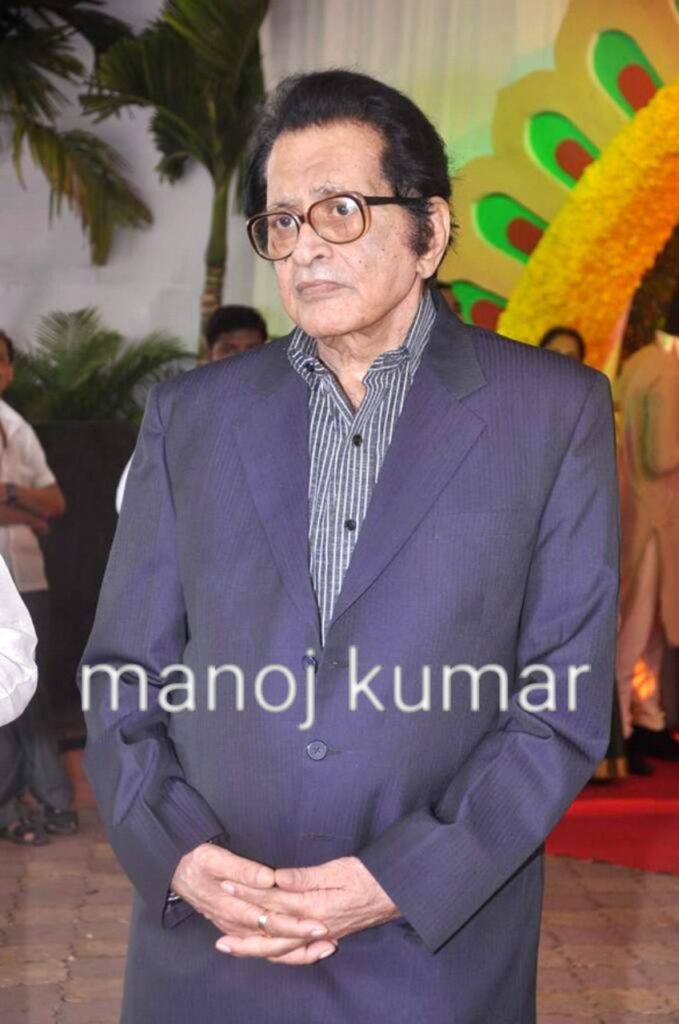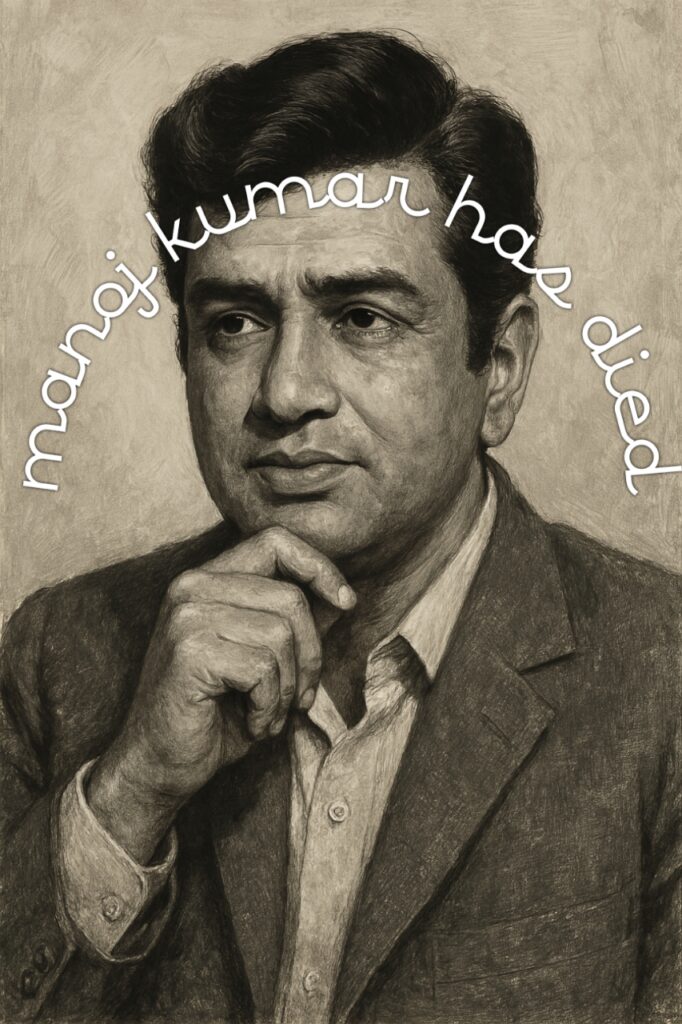Patriotic artist Shri Manoj Kumar is no longer with us. He took his last breath at the age of 87.
Manoj Kumar was one of the most renowned actors of his time, delivering numerous hit films. A unique feature of his movies was that they were filled with patriotism, like Kranti, among others. This is why he earned the nickname Bharat Kumar.
Along with being an actor, he was also a film director, screenwriter, lyricist, and editor. He was not only a multi-talented artist but also a very down-to-earth person.

His signature style of delivering dialogues with his hand placed on his face became his trademark. Even today, many videos are made and go viral imitating this style. Mimicry artists simply place their hand on their face while delivering dialogues, and the audience instantly recognizes that it’s an impression of Manoj Kumar.
In the enormous galaxy of Indian cinema, where stars come and go, few leave a legacy that extends beyond their works. Manoj Kumar is one such personality. He was more than just an actor or director; he was a storyteller about India’s essence. Manoj Kumar, known for his intense patriotism and love for the country, got the nickname “Bharat Kumar,” which captures the essence of the characters he played on screen.
Early Life and Background
Manoj Kumar was born Harikrishna Giri Goswami on July 24, 1937, in Abbottabad, currently in Pakistan. His family moved to India during Partition in 1947, a watershed moment in history that had a lasting impact on his life. The agony and relocation caused by Partition impacted the young Harikrishna’s ideals on nationalism, unity, and social justice, which he would later portray via his films.
Growing up in Delhi, he acquired a passion for movies and loved the renowned actor Dilip Kumar. His enthusiasm for Dilip Kumar was so deep that he chose to alter his name to Manoj Kumar, after one of his roles in the film Shabnam.
Entry into Films
Manoj Kumar started his cinematic career in the late 1950s. His early films, such as Fashion (1957) and Kaanch Ki Gudia (1960), did not make much of an impression, but his talent was clear. It wasn’t long before he gained recognition, and by the mid-1960s, he had established himself as a leading performer in mainstream Hindi cinema.
His performance as Indian liberation fighter Bhagat Singh in the 1965 film Shaheed marked a watershed moment in his career. The film resonated with spectators and was hailed for its honest and heartfelt portrayal of India’s battle for independence. It marked the beginning of Manoj Kumar’s career as the patriotic face of Indian cinema.

The Birth of “Bharat Kumar”
The film Upkar (1967) changed everything. Manoj Kumar wrote, directed, and acted in the film, which was inspired by the motto “Jai Jawan Jai Kisan” issued by then-Prime Minister Lal Bahadur Shastri. The film presented the narrative of a patriotic farmer who gives up all for the country. It was a huge success, emotionally resonating with audiences all around the country.
Manoj Kumar transformed into “Bharat” with Upkar, a character he would play in numerous later films to represent the ideal Indian citizen. His films began to emphasize national pride, cultural values, and the significance of unity, honesty, and sacrifice.
Notable Films and Themes
Following the success of Upkar, Manoj Kumar continued to explore themes of patriotism and social reform in his movies:
Purab Aur Paschim (1970)
is a film that contrasts Indian cultural ideals with Western modernity. It stressed the necessity of maintaining connected to one’s culture.
Roti Kapda Aur Makaan (1974)
addressed basic human needs and socioeconomic disparities in the country.
Kranti (1981):
An epic film about India’s freedom movement with a multi-star cast, including Dilip Kumar. It became one of the most successful pictures of its period.
Clerk (1989) focused on social corruption and moral decline.
Manoj Kumar regularly played numerous roles in his films, including actor, writer, and director. His unique approach comprised compelling dialogue, emotive storytelling, and a constant theme of patriotism.
Unique Style and Impact
Manoj Kumar’s flicks were unique. He wasn’t only making films for enjoyment. He wanted his films to educate, inspire, and make people think about society. He had a distinctive style:
Use of Indian symbols: His films frequently featured symbols of Indian identity, such as the national flag and Gandhi’s spinning wheel.
Emotional music: Songs from his films, such as “Mere Desh Ki Dharti” from Upkar, have become patriotic anthems.
Strong moral values: His characters were frequently idealists, willing to give up personal satisfaction for the greater good.
Criticism and Parody
Manoj Kumar’s distinct style made him a subject for ridicule. Some critics labeled his art as unnecessarily theatrical or preachy due to his overemphasis on patriotism and symbols. Exaggerated close-ups and impassioned speeches were occasionally used in popular comedy shows and films to emulate his approach.
However, Manoj Kumar handled it in stride. He understood that his job served a purpose and was proud of what he represented. He saw being mocked as proof that he had made an impact.
Personal Life
Despite his celebrity, Manoj Kumar led a quiet personal life. He married Shashi Goswami and they had two boys. Unlike many of his peers, he avoided controversy and focused on his profession and family.
In real life, he was recognized as a genuinely spiritual and patriotic guy who was frequently interested in social and national concerns. His humility and perseverance earned him respect not only in the film industry, but also among the general public.
Later Years and Recognition
As the film industry developed in the 1990s, Manoj Kumar gradually transitioned away from performing and directing. In the age of commercial masala films, his cinematic style was considered out of date. However, admiration for his legacy has never wavered.
In 1992, he received the Padma Shri, India’s fourth-highest civilian award. In 2016, he got the Dadasaheb Phalke Award, Indian cinema’s highest accolade, for his lifetime contributions to the industry.
Legacy and Influence
Manoj Kumar’s contribution to Indian cinema and culture is obvious. He established a space for patriotic cinema that was both moving and thought-provoking.
The route he paved has influenced filmmakers such as Anil Sharma (Gadar), Ashutosh Gowariker (Swades, Lagaan), and even present directors. His characters inspired generations to be proud of their ancestry, to put country first, and to challenge society’s moral orientation.
In today’s world, where films are frequently made with box-office goals in mind, Manoj Kumar’s movie reminds us that storytelling may also serve a national purpose.
Conclusion
Manoj Kumar may have moved away from the spotlight, but the light he brought to Indian film via his work still shines. He is remembered not only for his roles and films, but also for the emotions he evoked, the principles he defended, and the national pride he fostered.
As Bharat Kumar, he represented all Indians who value truth, sacrifice, and patriotism. In an era of shifting heroes, Manoj Kumar remains a timeless icon—the face of patriotism, the voice of conscience, and the heart of a grateful people.

Great one
Great performance in the movies